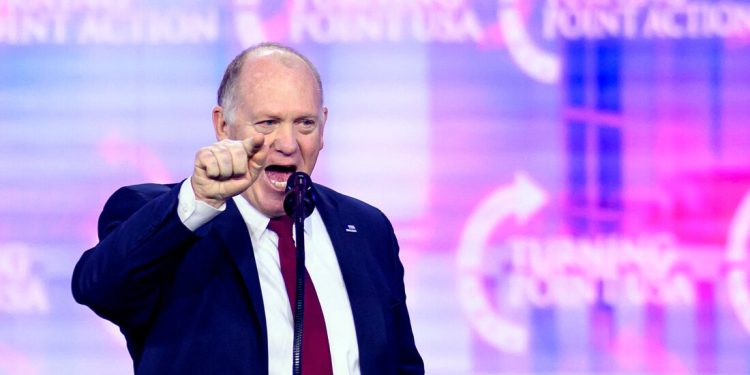
The White House’s new “border czar” Tom Homan speaks at Turning Point’s annual AmericaFest 2024 in Phoenix on December 22.
Jos Edelson/AFP via Getty Images
hide caption
toggle caption
Jos Edelson/AFP via Getty Images
New “border czar” Tom Homan says large-scale raids as part of President-elect Trump’s crackdown on illegal immigration are expected to begin as early as Tuesday.
In an interview with Fox News Friday evening, Homan did not provide further details, but he confirmed that Chicago would be one of the targeted cities.

“On Tuesday, ICE is finally going to come out and do its job. We’re going to take the handcuffs off ICE,” he said, referring to Immigration and Customs Enforcement (ICE).
Homan, former acting director of ICE, added that immigration agents will focus on “the worst first, public safety threats first, but no one is excluded. If they enter illegally the country, they have a problem.”
The planned Chicago raids were first reported by The Wall Street Journal. This comes after Homan visited the city in December and threatened to sue the city’s mayor if he refused to cooperate.
On Saturday, Homan said The Washington Post that the new administration was reconsidering launching raids in Chicago because details had been leaked in the media, but had not yet made a final decision.
Chicago is one of hundreds of sanctuary cities and counties in the United States that generally prohibit local resources from supporting the enforcement of federal immigration laws.
The prospect of raids in Chicago echoes Homan’s past remarks that he will not allow sanctuary jurisdictions to hinder the new administration’s crackdown on illegal immigration.
On Saturday, Beatriz Ponce de León, Chicago’s deputy mayor for immigrant, migrant and refugee rights, said the news that immigration raids could begin in Chicago on Tuesday “was not a surprise,” but that “the confirmation of the hearing made it more real, more concrete.”
She said the city is ready. In addition to community agencies holding “know your rights” events everywhere, she said Chicago leaders have met with city departments and sister agencies, such as the police and public school district, to detail existing city policies.

An estimated 11 million immigrants live in the United States without legal status.
Both Homan and Trump have pledged to carry out the largest deportation operation in US history. But the project is expected to face legal and logistical hurdles, including where to house millions of people once they are detained.
In Chicago, community organizers and elected officials are scrambling to encourage residents not to panic
In the city’s southwest, Any Huamani, a community organizer with the Brighton Park Neighborhood Council, was fielding requests for know-your-rights training and leading a rapid response team via a private group chat. Team members are ready to be dispatched in case ICE agents arrive in its community.
“Obviously every scenario is different,” Huamani said. “If they’re there to arrest someone, rapid response teams respond differently. We have to shout, ‘These are your rights. You know, who can we call? Give us a phone number.’ And we’re also trying to record… ICE agents, if there’s an ICE truck or if it’s an unrecognizable truck.”
In the meantime, 20 training requests had been received.
The biggest fear of immigrants who don’t have legal status in the United States, Huamani said, is leaving their children behind.
Under the first Trump administration, its “zero tolerance” policy separated more than 5,000 children from their parents crossing the border, with no system to trace and reunite families. Some also fear being arrested or detained in unfamiliar cities or states. Huamani advises people at risk of ICE detention to memorize at least three phone numbers so they can be located if they are taken into ICE custody.
Organizers fear ICE agents will target the city’s southwest and carry out raids on workplaces in nearby suburbs, where there are also large concentrations of immigrants without legal status.
Garien Gatewood, Chicago’s deputy mayor for community safety, said the police department has worked for 40 years under a welcoming city ordinance, which states that immigration enforcement is the responsibility of the government. federal.
The Chicago Police Department does not document immigration status or share information with federal immigration authorities, spokesman Don Terry said in a statement. But he added that police “will not intervene or interfere with other government agencies in the exercise of their duties.”
“From top to bottom, everyone at CPD understands the roles they play,” he said. “This is not the first time they have had interactions with federal agents acting on immigration status.”
Illinois Governor JB Pritzker’s office did not respond to the announcement that immigration raids would begin in Chicago next week. The office provided a transcript of the governor’s statement at a Dec. 11 news conference, in which he said he “feels it is his duty to protect” immigrants without legal status who do not have not committed violent crimes.
WBEZ has more on how Chicago is preparing for the new Trump administration.


